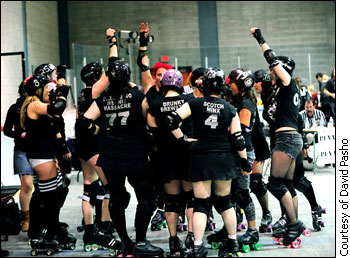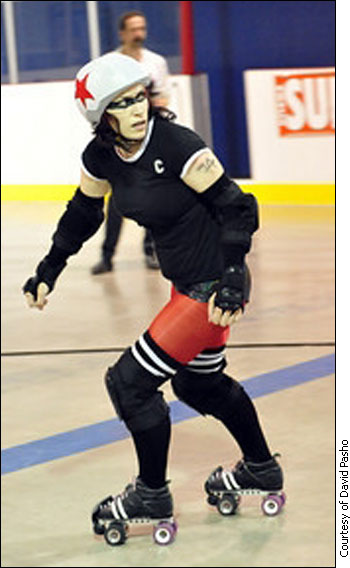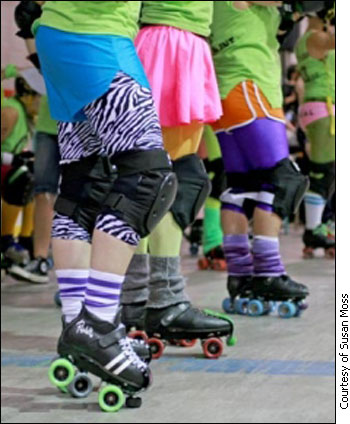Tags
Related Posts
Share This
Canadian women’s roller derby revival
Ottawa resident Natalie Campbell is far from your typical female amateur athlete. Under her alias, Drunky Brewster — a combination of her childhood nickname and adult habits — she does it all, routinely hitting, blocking and falling, all while sporting a cleavage-baring top.
Campbell plays for the Ottawa-area Slaughter Daughters in one of Canada’s fastest-growing, full-contact women’s skating sports. And no, it’s not hockey. It’s roller derby.

The Slaughter Daughters psych up for a bout at Montreal’s Beast of the East Tournament.
This rough lifestyle has come at a price to Campbell, who has sometimes suffered from track rash: a diamond-patterned irritation caused by falling onto the asphalt when wearing fishnets.
Due to other injuries, Campbell (who works as a graphic designer by day) hasn’t had feeling in her left buttocks for over a year. “My skates came out from under me and I ended up having a black bruise that took up my entire butt cheek for three months.” And compared to other girls in her league, the Rideau Valley Roller Girls, she’s one of the lucky ones.
Catching a wave
Once widely popular with TV audiences and amateur contestants of both genders, roller derby saw its appeal plummet in the late 1970s but has recently undergone a resurgence at an independent, grassroots level. Since 2003, roller derby has grown exponentially in North America. In five years, the Women’s Flat Track Derby Association (WFTDA) has gone from seven teams to 79 leagues across North America. Canada alone boasts about 23 leagues.
This new roller derby has garnered great attention; over 2000 fans attended the WFTDA’s regional and national championships. In the Ottawa region, the Rideau Valley Roller Girls’ bouts often sell out, sometimes with upwards of 800 fans.
For an amateur sport in Canada, roller derby has managed to attract huge crowds and increasing numbers of women wanting to try the sport. The question is why? Or at least why now?
Carolyn Storms, a sociologist at the State University of New York at Buffalo, thinks roller derby’s resurgence could be part of a larger trend toward violent sports, such for example the popular mixed martial arts competition Ultimate Fighting Championship.
Derby’s aggressive nature has certainly contributed to its rising popularity; however, many girls also say they have gotten involved with the skating sport because of its pro-female attitudes, its opportunities for roller skating and its novelty.
Modern roller derby is played on a flat track, which means teams can use any flat surface like a gym or parking lot. Each team sends out five players who skate in a pack during two-minute periods called “jams.” Points are scored when one player for each team, entitled “the jammer,” laps the pack while the other four players attempt to block the other team’s jammer from passing.

About to pounce: The Slaughter Daughters’ jammer prepares to lap the pack.
For women only
Montreal Roller Derby was one of the first leagues formed in Canada, in 2006. Montreal derby girl Cheryl Gladu (professional name: Ewan Wotarmy, or “You and what army?”) says that because the resurgent sport is predominantly female, it appeals to women who are tired of being undervalued in male-dominated institutions.
“Women are always the sideshow, just playing watered-down versions of male sports,” she says. “This is all about women playing a sport for women.”
Female bonding is a huge draw to the sport. Derby girls often are very close, on and off the track.
“The sense of the camaraderie in the league is unreal,” Gladu says. “I have a strong attachment to the women in a way I’ve never had in another sport.”
Derby girls aren’t in it only to socialize; they’re there also for love of roller skating and performance.
Kelly McAlear (Honey Bee), founder of the Ottawa Roller Derby league, sought to bring the sport to Ottawa after it had caught on in Montreal. She travelled every Tuesday to learn the ropes from the Montreal girls, and bought used skates to start her own league. She says she worked hard to revive the sport because she had loved roller skating as a kid and was always curious about derby.
Nancy Finley, a sociologist who has studied derby for over two years, agrees that roller skates are appealing to women.
“A lot of women feel really empowered skating. I see a lot of women who say, ‘I haven’t done this since I was a kid. I was always proud of myself when I was on skates,’” she observes.
‘A lot of women feel really empowered skating.’ — sociologist Nancy Finley
This is especially true for Canadian women, who have grown up with the ice traditions of hockey and recreational skating.
Gladu, a former hockey player, says although Canadian girls picked up derby later than Americans, they are catching up quickly because foundations in ice skating are transferable to roller skates.
She switched from hockey to derby after attending Montreal’s championship bout in 2008. “It was the biggest spectacle I’d ever seen for women’s amateur sport. You have hundreds of people cheering you on.”
A crowd-pleasing spectacle
The fans of roller derby in Canada are dedicated and growing. Montreal’s games are consistently sold out, and promoters have even began to sell Montreal derby merchandise like t-shirts, pins and beer cozies.
Finley says derby attracts more fans than your average amateur softball game because of the “talking dog syndrome”: people want to come see something unusual.
And with sassy derby names, skimpy costumes and bad-girl attitudes, derby really is like no other amateur sport.
Blackout Susan, Sister Disaster, Screaming Meanie Massacre and Scotch Minx: derby girl names can range from sexy to vicious but must be original. No two girls can have the same name.
Outfit choices also range from a sexy spectacle to simple and athletic. However, whether a girl comes out in fishnets or work-out shorts, she must cover herself up with protective padding; wrist guards, elbow pads, knee pads and helmets are a must.

Neon duds worn by Montreal’s New Skids on the Block take sports gear to a new level.
Gabriell Garcia (Chica Loca), the marketing chair for the WFTDA, says adornments like the names and costumes have contributed to derby’s rapid growth.
“It’s a full-contact sport where women are being aggressive but being feminine and staying true to their femininity. So it’s a really exciting show as well as sport,” she says.
Not for faint hearts
But roller derby encounters debate because of its aggressive nature.
Campbell admits the risk for injury is high. “Recently we played a game, and our biggest hitter broke her ankle, like it shattered,” she says. “Collar bone breaks are also common. Everybody’s always bruised up.”
However, Campbell says she risks injury because the physicality is what attracted her to roller derby. “It’s a sport where you’re encouraged to be more aggressive, and I feel like a lot of women aren’t often encouraged to be competitive and vicious.”
Some women feel the sport doesn’t need to be aggressive to be fun. McAlear has recently reformatted her league, Ottawa Roller Derby, to cut out hitting.
“Over the last three years I’ve seen a lot of bad stuff, and being at the hospital isn’t fun,” she says. “You need to respect those who don’t want to be hit. They should be able to have fun and be on skates too.”
It seems there is a market for the low-impact derby envisioned by McAlear. Her several open houses to pitch the idea have consistently brought crowded attendance and a waiting list.
Whether contact or non-contact, women’s roller derby has definitely roused a lot of interest in Canada. When asked what the future holds for the sport, Garcia of the WFTDA jokingly answers, “World domination.” But although she thinks it will keep growing, she also thinks modern derby should stay true to its grassroots.
At the team level, Campbell is just happy Ottawa has embraced the sport. Her Rideau Valley Roller Girls league is in the midst of introducing a new team, the Riot Squad; and with more girls in the league, the potential for travel to other cities will increase in the upcoming season.
However, even “if the sport doesn’t get any bigger, I don’t care, because I’m really happy with derby in Ottawa,” Campbell explains. “I’m excited to see what’s going to happen, and I know it’s going to be good.”
Related Links





